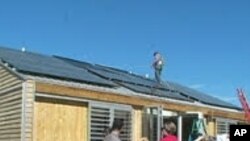On the National Mall in Washington, the 2009 Solar Decathlon has begun, with 20 university-led teams from four countries. Each has built a high tech and high efficiency solar powered home. The competition represents the next generation of clean energy pioneers and entrepreneurs.
Construction continued - frantically - during the opening ceremony.
More than 800 students from the United States, Canada, Spain and Germany are competing.
They came to the U.S. capitol to showcase the latest in green technology and solar energy as part of the US government's 2009 Solar Decathlon. The contest rewards the most attractive, energy-efficient, solar-powered house built by the students.
U.S. Energy Secretary Steven Chu's opening remarks contained a pep talk for students as well a dose of reality on energy consumption.
"In the United States roughly 40 percent of the energy goes into buildings, either commercial or residential buildings," he said. "And just so happens that roughly around the world that fraction is still about the same."
The 20 teams were chosen two years ago through a competitive process.
"Team Spain" presented its project, the "Black and White House." The solar panels on the roof tilt to follow the sun during the day. They sit on a pyramid that allows easy movement. Professor Giuseppe Adell from Universidad Politecnica de Madrid explains.
"What makes the roof tilt is a pneumatic system with a motor that pulls some cables and that is programmed to turn with the daylight," he explained.
Adell says the vertical panels on the facade of the house are also solar receptors which turn manually, according to the sun's location. He says the house can produce enough energy to be self-sufficient.
Cornell University is participating for the third time, with 150 students. Theirs is the only circular house, inspired by the shape of a silo. Chris Werner is Cornell's team leader.
"The house is entirely solar powered. We generate all of our hot water and heating from the solar vacuated tubes that you see behind me right now. We have 40 General Electric photovoltaic panels on top of our roof so we have all the power we need for the entire house," said Chris Werner, Cornell's team leader.
Werner adds that the students hope the panels will produce more energy than the house needs so they can sell electricity back to the grid.
The Solar Decathlon evaluates ten different elements ranging from architecture, to engineering, comfort and marketability. The exhibit continues through October 18.




